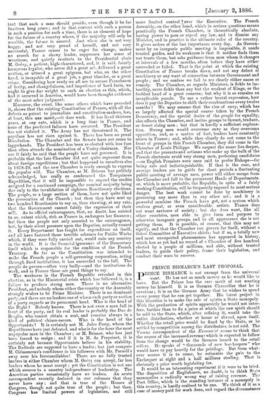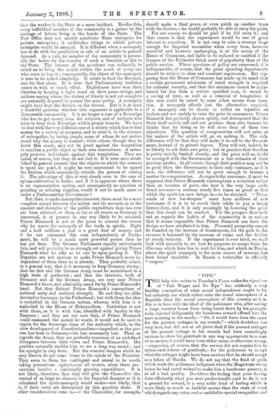PRINCE BISMARCK'S LAST PROPOSAL.
PRINCE BISMARCK is not exempt from the universal want. He has not as much money as he would like to have. But the Prince has the rare merit of not wanting money for himself. It is as German Chancellor that he is covetous ; it is on the German Army that he wishes to spend every penny that he can get together. His latest project in this direction is to make the sale of spirits a State monopoly. With the production of spirits apparently he would not inter- fere, further than to fix a price at which the raw spirit should be sold to the State, which, after refining it, would take the entire distribution, whether at home or abroad, upon itself. Whether the retail price would be fixed by the State, or be settled by competition among the distributors, is not said. The Vienna correspondent of the EcononM seems to think that the source of the increasedsevenue which is expected to follow from the change would be the licences issued to the retail sellers. He speaks of "thousands of new bar-keepers" who would have to pay heavily for the privilege. But from what- ever source it is to come, he estimates the gain to the Exchequer at eight and a half millions sterling. That is obviously a prize worth legislating for.
It would be an interesting experiment if it were to be tried. The disposition of Englishmen, no doubt, is to think State monopolies a radically wrong way of raising revenue. The Post Office, which is the standing instance of a monopoly in this country, is hardly realised to be one. We think of it as a case of money paid for work done, and regard the circumstance that the worker is the State as a mere incident. Besides this, every individual member of the community is a gainer by the carriage of letters being in the hands of the State. The Post Office does not merely substitute State enterprise for private enterprise ; it undertakes things to which private enterprise would be unequal. It is different when a monopoly has to do with the production or sale of an article in general demand. As a rule, no member of the community is person- ally the better for the transfer of such a function as this to the State. The interest of the merchant can ordinarily be relied on to bring the article within the reach of every one who cares to buy it ; consequently, the object of the monopoly is seen in its naked simplicity. It exists to feed the Revenue, and for that alone. It is here that Parliamentary tradition comes in with so much effect. Englishmen have won their liberties by keeping a tight hand on their purse-strings, and nations among whom the victory of liberty is not yet complete are naturally disposed to pursue the same policy. A monopoly might have kept the Stuarts on the throne. But it is at most a doubtful question whether this argument is applicable to a Democratic community. It is no longer a case of a Sovereign who has to get money from his subjects, and of subjects who have to keep their Sovereign within proper bounds. We have to deal with the very different case of a society which has to find money for a variety of purposes, and to raise it, in the absence of monopolies, by taxing people, some of whom do not under- stand why the money is wanted ; while others, though they do know this much, may not be proof against the temptation to sacrifce a public object to their own convenience. A mono- poly protects individuals against this temptation. They are taxed, of course, but they do not feel it. If it were once estab- lished by general consent that the objects on which the revenue is spent are good, it might be very convenient to be spared the friction which occasionally attends the process of raising it. The advantage of this is very clearly seen in the case of opium-cultivation in India ; and if it is apparent where there is no representative system, and consequently no question of granting or refusing supplies, would it not be much more so under a Parliamentary Government ?
But, then, to make monopolies innocent, there must be a more complete accord between the nation and its servants as to the amount and character of the public expenditure than has ever yet been attained, or than, so far at all events as Germany is concerned, is at present in any way likely to be attained. Prince Bismarck is not at the pains to conceal the reason why he wants the monopoly of the trade in spirits. Eight and a half millions a year is a great deal of money, and if he can command this sum independently of Parlia- ment, he will be a much more powerful person than he has yet been. The German Parliament equally understands this, and will probably be as strongly set against giving Prince Bismarck what he asks as he can be upon getting it. The Deputies are not anxious to make Prince Bismarck more in- dependent of them than he is already. They probably admit, in a general way, that it is necessary to keep Germany strong ; that for this end the German Army must be maintained in a high state of perfection ; and that the interests, both of Germany and of the German Army, are very near Prince Bismarck's heart, and admirably cared for by Prince Bismarck's head. But they distrust Prince Bismarck's conceptions of national unity and national strength. He and they are alike devoted to Germany, to the Fatherland ; but with them the idea is embodied in the German nation, whereas with him it is embodied in the House of Hohenzollern. Patriotism is not with them, as it is with him, identified with loyalty to the Emperor ; and they are not sure that, if Prince Bismarck could command the money he wants, it would not be used to regain for the Sovereign some of the authority which, in the slow development of Constitutionalism—imperfect as the pro- cess has been in Germany—he has necessarily lost. Then, as regards the Army, they are probably conscious of an undefined divergence between their views and Prince Bismarck's. His position naturally enables him to see a long way round ; and his eyesight is very keen. But the remoter dangers which he may discern do not come home to the minds of the Deputies. They seem to them too contingent and unreal to be worth taking precautions against,—at all events, when these pre- cautions involve a continually growing expenditure. It is not likely, therefore, that they will give the Chancellor the control of so large an element in the Imperial finances as it is calculated the spirit-monopoly would make—not likely, that is, if their votes are determined by this question alone. If other considerations come in—if the Chancellor, for example, should make a final peace, or even patch up another truce with the Centre,—he would probably be able to carry his point.
For one reason we should be glad if he did carry it ; and that reason is that the experiment would be one of great interest to ourselves. It is not easy to raise a revenue large enough for Imperial necessities when every item, however essential and however unchanging, is at the mercy of the House of Commons, and liable to be reduced or omitted if the framers of the Estimates think more of popularity than of the public service. Where questions of policy are concerned, it is indispensable, of course, that the great spending departments should be subject to close and constant supervision. But sup- posing that the House of Commons has made up its mind that a certain permanent minimum of naval strength is required for national security, and that this minimum cannot be main- tained for less than a certain specified sum, it would be a saving of time, as well as a removal of temptation, if this sum could be raised by some other means than taxa- tion. A monopoly affords just the alternative required, if a monopoly can be shown to inflict no injustice on traders, and not unduly to raise the price to consumers. Prince Bismarck has probably chosen spirits, and determined that the State shall merely sell and not produce them also, because he thinks that by doing so he will steer clear of these two objections. The question of compensation will not arise, as the makers of the article will go on making it. The only difference will be that they will make it to sell to the Govern- ment, instead of to private buyers. They will not, indeed, be at liberty to ask their own price ; but in practice that freedom is pretty strictly limited already, and the price will no doubt be arranged with the Government on a fair estimate of their previous profits. At all events, though their position may not be so good when the Government is their only customer, as it is now, the difference will not be great enough to become a matter for compensation. As regards the consumer, it must be supposed that Prince Bismarck contemplates a reduction rather than an increase of price, else how is the very large addi- tional revenue—a revenue nearly five times as great as that which the spirit-tax now brings in—to be obtained. "Thou- sands of new bar-keepers" must have millions of new customers if it is to be worth their while to pay a heavy licence-duty, and it is only seemingly by lowering the prize that this result can be reached. Yet the prospect thus held out as regards the habits of the community is so serious that it seems impossible that Prince Bismarck can have the design we have attributed to him. Financial prosperity cannot be founded on the increase of drunkenness, for the gain to the revenue is balanced by the increase of crime and the decline of steady industry. If the experiment is ever tried, we shall look with curiosity to see how he proposes to escape from the dilemma which here lies in wait for him, and which in Russia, where the spirit monopoly is the main source of revenue, has been found insoluble. In Russia a teetotaller is officially " suspect."











































 Previous page
Previous page